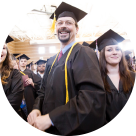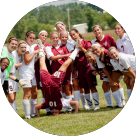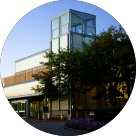Recently Visited Pages
Take advantage of this at-a-glance look at the pages on the SCC website you most often visit. Use this as a tool to navigate quickly to info you need the most. Take it one step further and click the star in the top right corner to ensure your favorite pages remain on your list of Visited Pages.
News
SCC students get their hands dirty digging for life-saving antibiotics
Published: 09/30/2019
Antibiotics helped to usher in the modern era of human health and longevity, but experts agree the world now faces a crisis as over-prescription by doctors and over-use by global animal farming has led to wide-spread bacterial resistance. The problem is that antibiotics are both difficult and expensive to discover and produce, leading to a lack of innovation and investment by pharmaceutical companies and an alarming scarcity of effective treatment.
This year, SCC students have joined the fight, digging and sampling soil from the campus and beyond, then cultivating bacteria in the lab to help combat one of the world’s most pressing health threats by searching for naturally occurring antibiotics.
According to the World Health Organization , “Antibiotic resistance leads to higher medical costs, prolonged hospital stays, and increased mortality…[and] without urgent action, we are heading for a post-antibiotic era, in which common infections and minor injuries can once again kill.” Research into antibiotic resistance estimates that more than 700,000 people die each year as common diseases become untreatable.
Tiny Earth, a network built on crowd-sourcing antibiotic discovery, enlists students all over the world to take samples of soil and search for a diamond in the rough - an organism or molecule with antibiotic properties which could later be developed into life-saving drugs.
The program is headquartered at the University of Wisconsin-Madison’s Wisconsin Institute for Discovery. Annually, nearly 10,000 students participate in some version of the course, spanning 46 U.S. states and 15 countries. Working with Professor Monica Hall-Woods, SCC students are now actively participating in the program.
“Tiny Earth is student-sourced, not just crowd-sourced,” says Hall-Woods, “so we’re training the next generation of scientists as well as providing a crucial resource to help fight antibiotic resistance. The hands-on work is ‘discovery-based,’ meaning instead of spending their time in the lab repeating experiments in which the outcomes are well-known, students are participating in literally ground-breaking work.”
“This work builds on a national trend, especially at the community college level, to expose undergraduate students to research experience, and has contributed to SCC’s affiliate partner status with CCURI, the Community College Undergraduate Research Initiative. It’s a great thing when science engages and educates while at the same time helps save the world,” says Professor Hall-Woods.









